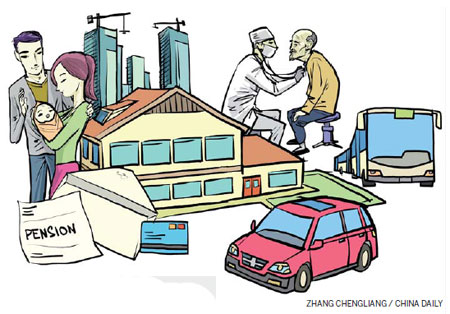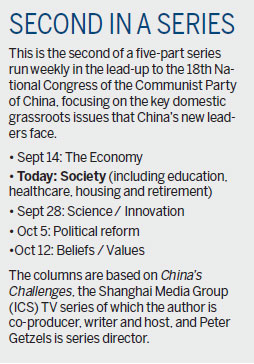The 'big four' concerns of Chinese
Updated: 2012-09-21 08:58
By Robert Lawrence Kuhn (China Daily)
|
||||||||


An ancient Chinese philosopher described the perfect society as "living in harmony, treating others as family... there is love and caring for the elderly ... nourishment and education for children ... kindness and compassion for widows, orphans, the disabled and the sick".
Historically, such harmony is the standard of happiness.
But now, after vast economic development, are the Chinese people happy?
What I hear are the "big four" social concerns: education, healthcare, housing and retirement.
These challenges are what China's new leaders face.
For over two decades, I've witnessed the astonishing growth of China's economy. At the same time, I've watched burgeoning economic disparity and social inequality between rich and poor, urban and rural, become China's most severe and alarming problem. I've wondered, could equality in education be a partial solution?
If I'm a poor migrant worker, but if my child has an equal opportunity for a good education - and thus has an equal opportunity for a good life I'd be more willing to endure my own hardships.
How to provide equality in education? I visit the Jin Ding elementary school in Shanghai, where all the students are children of migrant workers. Sure, they're better off here than they'd be in their rural hometowns - but how will they feel when they realize that they're not like the children of Shanghai residents?
There are more than 200 million migrant workers in China. In Shanghai alone, there are about half a million children of migrant workers. Over 40 percent of students in Beijing and Shanghai are non-residents. At best they are second-class citizens.
Migrant workers built these cities, and through education they expect to change their children's fate. But even for successful migrant families, their children cannot overcome structural barriers. They may dream of going to college, but they cannot. According to current policy, migrant workers' children receive compulsory education from elementary through middle school, but if they do not return to their hometowns when they reach 9th grade, they can apply only to vocational schools. This means their careers will be similar to that of their parents' - construction workers, hotel attendants, maids, cooks. And if they do return, the education is so inferior they will not pass the rigorous college entrance exams.
Worse are the "left-behind children," the multitudes of rural kids, 60 million of them, who have not moved with their parents to the big cities. Their parents return home generally only once a year, and then only for a short visit. "Left-behind children" are a national heartbreak.
Disparities in education cripple the capacity of education to make opportunities equal, to level the playing fields of life and career. For many, the "Chinese Dream" can never come true.
In 2012, Premier Wen Jiabao promised that educational funding would grow to 4 percent of China's GDP, a major commitment to China's future.
Healthcare affects everyone and China's system suffered in the transition from a planned to a market economy. No one is satisfied - not patients, not doctors, not society.
At 7:30 am I arrive at Ren Ji Hospital, one of Shanghai's best. The lobby is packed with people, many already waiting for hours. Ren Ji was built to treat 2,000 patients a day; it now handles 8,500. Something has to give care, costs, service, time. The system is overburdened: hospitals are besieged and doctors overwhelmed.
So an underground economy, insidious and illegal, has spawned. Scalpers exploit the vulnerabilities of patients frustrated by long waiting times. They arrive at a top, in-demand hospital early, register, and then resell their short-wait positions to desperate, real patients who arrive later. Scalpers charge up to 500 yuan ($80, 60 euros). Another odious practice is hong bao, the "red envelopes" stuffed with cash that patients must all too often use to bribe doctors.
Imagine a system in which you must wait for hours, your doctors are overworked and underpaid, you may have to pay scalpers or offer bribes - and you only get five minutes of care. Moreover, healthcare in China is wildly uneven. In some rural areas, medical services are dangerously scarce, and when available, decades behind.
In 2009, China launched healthcare system reform. In three years, basic medical insurance covered 1.3 billion people, about 95 percent of China's population. And a rural cooperative medical service system provides basic medical care.
When I ask young adults in China's big cities, "What's your biggest problem?", they do not hesitate. "Housing," they often exclaim, "Housing prices."
Those who move to Beijing are called "Beijing Dream Pursuers" - to own a home in Beijing is the ultimate goal. But "the sandwich class" are people caught between having too much money to qualify for public housing and not enough to buy private housing - at least not in the areas they'd like.
The housing price problem is severe, and the din of complaints, especially among young adults, is intense. This gives the government a major housing headache: How to control housing prices, but without harming the real estate market? Because while escalating housing prices aggravates urban buyers, China's entire economy is rooted in real estate.
China's leaders tell me that they need to stimulate the domestic economy by increasing consumption. But the Chinese people resist spending. They prefer to save. Why? They worry about retirement.
Chinese society has become an aging society; each year the elderly population increases by 8 million. In Shanghai, people aged 60 and above constitute about 25 percent of the population.
In downtown Shanghai, it's now hard to find a nursing home vacancy. In response, the municipality proposed that 90 percent of the elderly stay at home and only 10 percent go to nursing homes. But with one-child families and careers demanding more work and travel, if the elderly stay at home, who can care for them? (In traditional Chinese society when large families lived together caring for seniors was shared.)
Responding to the aging society, Shanghai is the first city in China to extend the retirement age. The new "flexible retirement policy" enables some males to retire at age 65 and females at age 60. To provide income for retirement, Shanghai will test the first "personal, tax-deferred pension insurance system".
China's overarching goal is to become a "moderately well-off society". To achieve this, China must solve the "big four" social problems - education, healthcare, housing, retirement. China's leaders recognize it. China's people demand it.
A personal note. Commentating about China invites critique, and one of the criticisms leveled against me has been that much of my work focuses on State leaders, not common people. China's Challenges brings me to China's grassroots. To know China, one needs to know both leaders and people.
Dr Robert Lawrence Kuhn is an international corporate strategist and investment banker. He is the author of The Man Who Changed China: The Life and Legacy of Jiang Zemin and How China's Leaders Think (featuring China's new leaders). He is a regular commentator on China (BBC, Bloomberg, CCTV, CNBC and Euronews). The views expressed in the article do not necessarily reflect those of China Daily.
(China Daily 09/21/2012 page8)

 Relief reaches isolated village
Relief reaches isolated village
 Rainfall poses new threats to quake-hit region
Rainfall poses new threats to quake-hit region
 Funerals begin for Boston bombing victims
Funerals begin for Boston bombing victims
 Quake takeaway from China's Air Force
Quake takeaway from China's Air Force
 Obama celebrates young inventors at science fair
Obama celebrates young inventors at science fair
 Earth Day marked around the world
Earth Day marked around the world
 Volunteer team helping students find sense of normalcy
Volunteer team helping students find sense of normalcy
 Ethnic groups quick to join rescue efforts
Ethnic groups quick to join rescue efforts
Most Viewed
Editor's Picks

|

|

|

|

|

|
Today's Top News
Chinese fleet drives out Japan's boats from Diaoyu
Health new priority for quake zone
Inspired by Guan, more Chinese pick up golf
Russia criticizes US reports on human rights
China, ROK criticize visits to shrine
Sino-US shared interests emphasized
China 'aims to share its dream with world'
Chinese president appoints 5 new ambassadors
US Weekly

|

|






